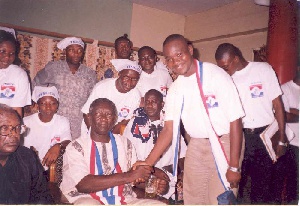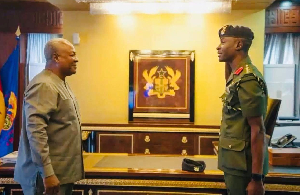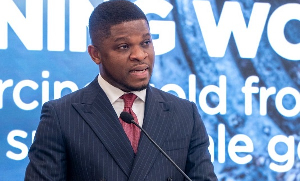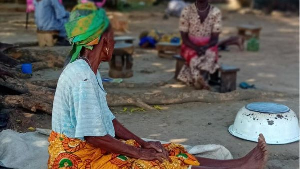Seven years ago, a new political guild in the New Patriotic Party (NPP) hit our political landscape, and ever since, it has grown to become a strong political force, not only in NPP, but the country as a whole. On January 8 2000, The Tertiary Students Confederacy of the NPP (TESCON) was inaugurated by Mr. J. A. Kufuor, the then presidential candidate of the New Patriotic Party. So, on the occasion of its 7th anniversary, I would like to congratulate all those who in diverse ways have played a part in its construction and continued existence. It is also an opportunity to straighten the records as far as the formation of TESCON is concerned.
Prior to the 2000 general elections, the NPP had lost in two elections to Rawlings National Democratic Congress (NDC), amidst widespread controversy. Among the reasons assigned to the two consecutive loses were rigging on the part of the ruling party, arising from our inability to mobilize a lot of our foot soldiers to serve as party agents at the various pooling stations to monitor the voting process. As a matter of fact, the 1992 elections were comprehensively rigged resulting in the boycott of the parliamentary elections by the then opposition parties led by the late Prof. Adu-Boahen. This was even corroborated by the international observers who were here to witness the elections. Also, in the 1996 elections, there were series of irregularities reported by international observers, but the then opposition leader J. A. Kufuor accepted defeat – contrary to the expectations of some party hardliners – so as to avoid possible crisis in the country.
When he was launching his bid in 1998 to context the NPP presidential primaries, Hon. Nana Addo Danquah Akufo-Addo, declared that “it takes two to tango” – meaning, it takes two to rig elections, and that if we were to beat the NDC we had to work harder to avoid the rigging. For those of us who were NPP activist at the tertiary education institutions at the time, that was the greatest inspiration for us to come together and reorganize the then latent NPP branches in the tertiary education institutions into a formidable branch of the party that was capable of mobilizing its members to serve as pooling agents across the country, and also propagating the party’s manifesto and campaign message.
The idea to form TESCON was, therefore, conceived at a meeting at Kwame Nkrumah University of Science and Technology (KNUST) branch of NPP at the Republic Hall of KNUST. At that time, the NPP group on the campuses was known as the NPP students wing, and such the name lacked the vitality and vigorousness that would make the group stand up to the challenge posed by the then vibrant TEIN of NDC. Under the leadership of Mr. Sam Cudjoe, (now secretary of Ashanti Region NPP) a committee – chaired by the author - was set up to work out the modalities for the formation of TESCON. As we celebrate seven years of TESCON’s contribution to politics in Ghana, I would like to pay tribute to the founding members who, together, worked hard at the committee stages to make the formation of TESCON a reality. Those I can easily remember are the likes of Sam Cudjoe (now regional secretary of NPP in Ashanti Region), the author, Peter Abban (now in the army) John Krugu, Okoto, Osei Akoto (a.k.a Ayaazo) and few others. As part of our terms of reference, we were tasked to adopt a name that would be catchy and beguiling. Since TESCON was to be a network of the various NPP branches in the tertiary institutions, the word confederacy – a popular term mostly used in the colonial era - was suggested and adopted. The committee advised that, as a pilot, the institutions in Ashanti region be used to start the “project” and as such, the author was tasked to travel to the tertiary institutions in Ashanti, including University College of Education (both Kumasi and Mampong Campuses), Institute of Management Studies (IMS), Kumasi Polytechnic, and of course, KNUST to coordinate activities and help establish branches where there was none, as was the case of the Mampong Campus of the University College of Education. It was also at the committee meeting that the slogan of TESCON – “Commitment without Inducement” was suggested and adopted. The motivation behind this slogan was that our total commitment to work for the party in the campuses was not induced by money or self aggrandizement as was the case for NDC’s TEIN, but because of our believe in the NPP Project – development of our country in freedom. After all the modalities had been worked out, the stage was set for its inauguration. However, the inauguration was delayed due to lack of funds until new crop of party/student activists (including the author, Effah Ameyaw, John Krugu, Sefa Dwamena, etc) assumed the leadership of the KNUST branch of NPP. Various attempts to raise funds for the inauguration proved futile until one day at a meeting at the Republic Hall of KNUST attended by Hon. Dr Anane (then MP for Bantama) and the Late Hon. Osei Kwaku (then MP for Asokwa West). After the author had complained of the party’s inability to provide funds for the inauguration, Dr Anane and Hon Osei Kwaku intervened with financial support. They also pledged the support of their colleague MPs in the Kumasi Metropolitan Area who were not present at the meeting. These included Hon. Dr Addo Kufuor (MP for Manhyia), Hon. S. K. Boafo (MP for Subin) and Hon. Osei Kyei Mensah-Bonsu (then MP for New Tafo Suame). I salute these MPs whose initial financial support made the “TESCON Project” a reality. I wish to commend Professor Albert Owusu-Sarpong for his support, leadership and sacrifice. After raising the needed funds; the next major huddle was to have the then NPP presidential candidate J. A. Kufuor to grace the occasion. I had the opportunity to meet with Mr. Kufuor in Kumasi and invited him to attend the inauguration as the Keynote Speaker. Having explained to him the whole concept of TESCON and its objectives, Mr. Kufuor embraced the “TESCON Project” and promised to attend the inauguration. So on January 8 2000, TESCON was inaugurated at the courtyard of Independence Hall, KNUST by Mr. Kufuor with a call on its leaders to extend their educational campaign to the rural areas where the party was known to be weak in terms of votes (Daily Graphic 12/01/2000). He pledged his personal support and that of the party in ‘resourcing’ TESCON to be able to achieve its objectives. The day saw the assembly of party giants such as Hon. J. H. Mensah, Hon. Dr K. K. Apraku, Hon. Dr. K. Addo Kufuor, Hon. S. K. Boafo, Dr Dsane Selby, the Late Hon. Osei Kwaku, F. F. Anto, and many others. The author was elected and became the first president of TESCON, and his tenure saw the replication of the “TESCON Project” in all tertiary institutions in the country. The first to join the ‘wagon’ was the University of Ghana branch, under the leadership Hon. Isaac Asiamah, then branch president, after he had been briefed by the author of the “TESCON Project”. I would like to thank Mr. Dan Botwe, former General Secretary for the leadership he provided throughout the process.The multi-million dollar question now is, has TESCON lived up to its objectives? Is there anything to celebrate? I’ll say emphatically yes and I know I’ll equally be speaking the minds of the other founding members. Right after its formation, the Ashanti branch of TESCON, true to the advice of Mr. Kufuor, started political outreach programs to the problem areas in the region especially Ejura-Sekyeredumasi, Akomadan and New Edubiase. In fact, there were several other outreach programs by TESCON branches in other regions before the 2000 elections. During the 2000 elections, TESCON sent its members to the four regions (Volta, Northern, Upper West and Upper East regions) where the party structures were considered weak, and served as pooling agents for the party. Ashanti TESCON alone, under the leadership of Mr. John Krugu, sent over 500 students to the three northern regions for the November 7 presidential and parliamentary elections, and later about 500 more for the December 28 presidential run-off. The Legon branch also sent several of its members to the Volta regions and served as pooling agents, and indeed so was the case for the branches in other regions. The “pooling agent project” helped the party to avoid another rigging by the ruling NDC, and as a result, the NPP secured its first electoral victory in the Fourth Republic. This great feat cannot pass without the mention of party giants like Dr Amoako-Tuffour, Asuo Banin, F. F. Anto, Dr K. K. Apraku, Kwame Owusu and Alhaji Kwasi Yeboah who supervised the “pooling agents project”. Again, my fervent thanks to Hon. Nana Akufo-Addo for accepting to be the lead speaker at TESCON first rally at the Independence Hall, KNUST. In his speech, Hon. Akufo-Addo described TESCON as an excellent organization and gave TESCON the message for its outreach programs. At the rally, Hon Addo-Kufuor said the best birthday present Ghanaians could give to Mr. Kufuor was to vote for him on December 7, the eve of his birthday. My commendation also goes to Mr. Andy Appiah-Kubi for his leadership and commitment to TESCON during his tenure as NPP youth organizer. The Chief of Staff, Hon. Kwadwo Mpiani also deserve a special acknowledgement for his personal commitment to the continued existence of TESCON.
It is worth noting here that the political landscape of today bears a lot of resemblance to the prevailing circumstances in the country in 1999 when the TESCON movement started. And the role TESCON played in the 2000 and 2004 elections were very crucial to the victory of the NPP. This has led to a new system of politics in Ghana where almost all the political parties garnering for the 2008 general elections, are now making serious inroads to the campuses of tertiary institutions. Media speculations are rife on new political groupings springing up in our campuses. Writing as a founding member and first president of TESCON, and looking back in retrospect the role TESCON played in the 2000 elections, it appears to me that how political parties manage student support from now to the peak of 2008 elections would be the determining factor in the election victory. It is the author’s hope that the NPP will learn from its successes in the past and reinvigorate the TESCON structures on the campuses to ensure a landslide victory in 2008.
Long live TESCON, Long live NPP, Long live Ghana.
















